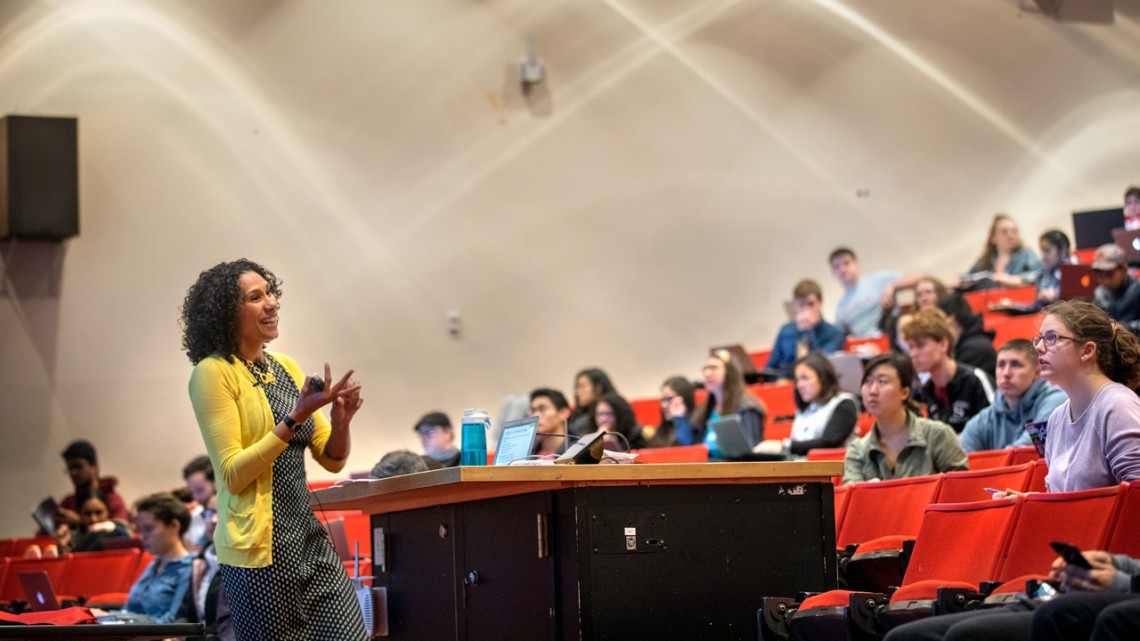
Anna Haskins, assistant professor of sociology, speaks during an Introduction to Sociology class in Uris Hall.
Sociology department launches Active Learning Initiative project
By Linda B. Glaser
The lecture hall boasted hundreds of seats, a room so large the professor had to wear a microphone to be heard. But unlike some large classes, no one was zoning out in the last row. Instead, the students were alert, aware that at any moment they might have to use their iClickers to answer a question, or break into small groups for discussion. In this Introduction to Sociology class, everyone pays attention.
The class is the first of five large introductory lecture courses in the Department of Sociology, College of Arts and Sciences, that will be transformed with grant funding from the Active Learning Initiative (ALI) to include a larger share of activities that require student participation and engage students to learn by doing rather than passive listening. Approximately 600 students each year take these sociology courses.
“The more we can actively engage our students, the more opportunities we provide for students to challenge their preconceived beliefs about social processes, learn from their peers, and develop the skills to think critically about social structure, social dynamics, and the promises and pitfalls of social scientific modes of inquiry,” said Vida Maralani, co-leader of the sociology ALI project.
The project is transforming discussion sections as well as lectures, and linking activities more closely between the two. In addition to the active learning activities used for the lecture – such as clicker poll questions, think-pair-share activities, and short data analysis activities – the sections are structured to include activities in which students themselves produce material.
The activities are designed by ALI postdoctoral fellows Kelly Nielsen and Melissa Pirkey and fine-turned by the teaching team, which includes the faculty instructor and the course teaching assistants. The staff at the Center for Teaching Excellence also provide ongoing guidance and support to the project.
To help faculty transform their courses, the ALI team is developing an online database of active learning activities. In addition, the team is hoping to continue to offer training and professional development in active learning methods to graduate students.
“We’re excited to develop these materials for our introductory courses and to learn how to effectively transfer these strategies across different instructors of the same course,” said project co-lead Kim Weeden, the Jan Rock Zubrow ’77 Professor in the Social Sciences and chair of sociology.
The ALI team collected baseline data on the introductory courses, as part of a rigorous evaluation designed to assess how well ALI activities work to improve student learning. The ALI grant will enable the team to publish the results of their evaluations.
“Our goal is to make active teaching and learning a central part of the sociology discipline; we see this project as a great opportunity for the discipline as well as the department,” Nielsen said.
One example of an active learning activity used in the Introduction to Sociology course addressed the concept of race as a social construct. In the class activity, students were given the census categories for race in the U.S. from the first census – in which there were only two – to the most recent, which has five. The students had to take celebrity figures, like NBA star LeBron James, and figure out in which category they would have been put in the different census years.
“The exercise showed students how the concept of race changes over time and place; it doesn’t exist on its own,” said Anna Haskins, assistant professor of sociology, who is teaching the class.
“The most important takeaway from ALI classes, what students seem to really gain,” Pirkey said, “is that it’s not just about getting the right answer but getting them involved in the experience and wanting to engage more.”
Linda B. Glaser is a staff writer for the College of Arts and Sciences.
Media Contact
Get Cornell news delivered right to your inbox.
Subscribe
